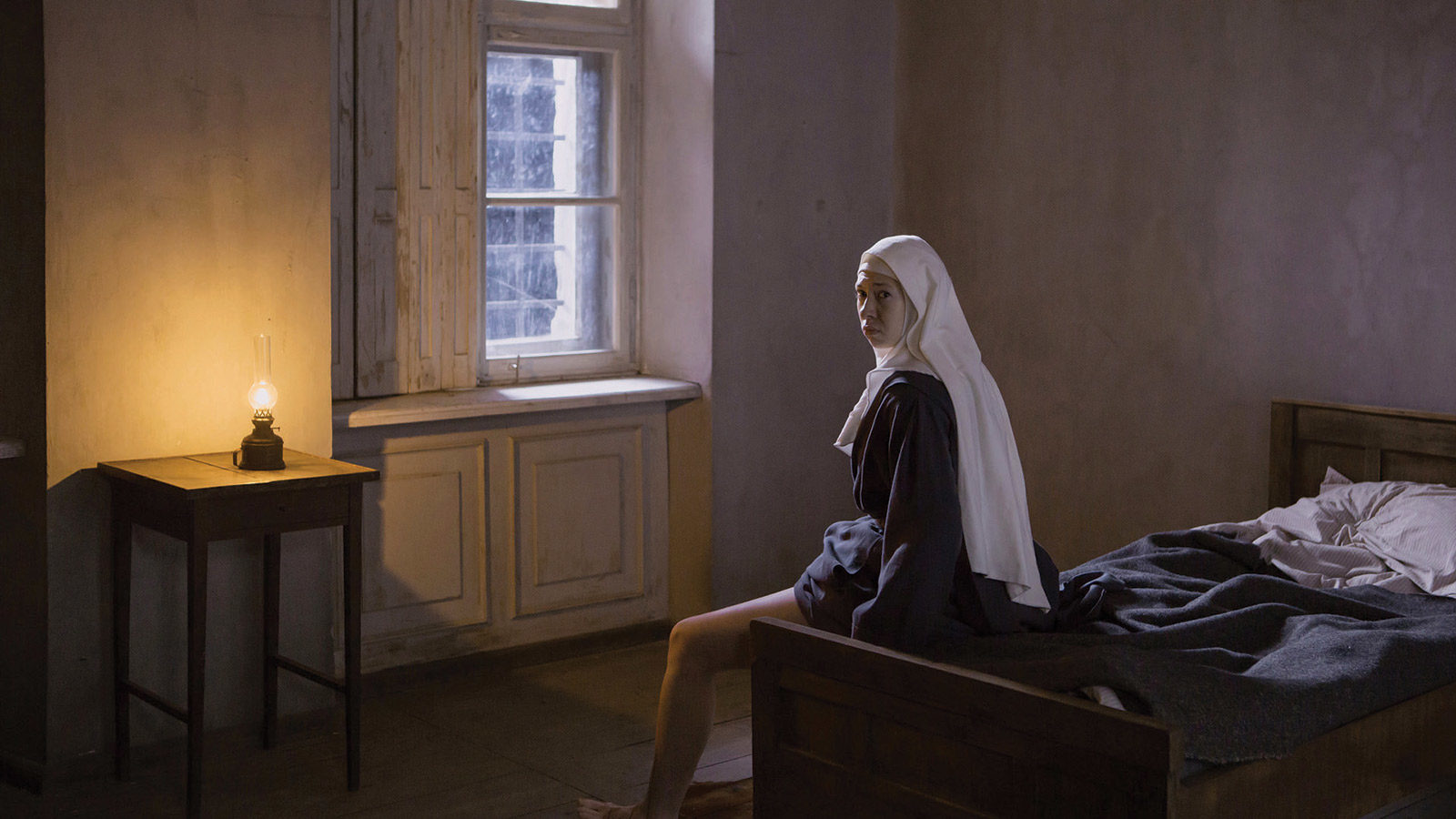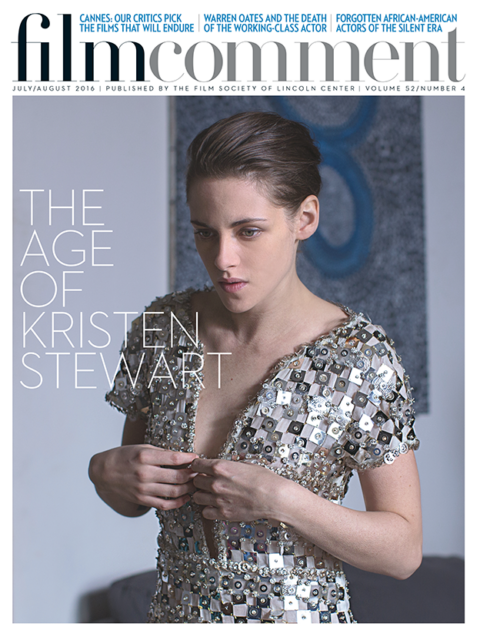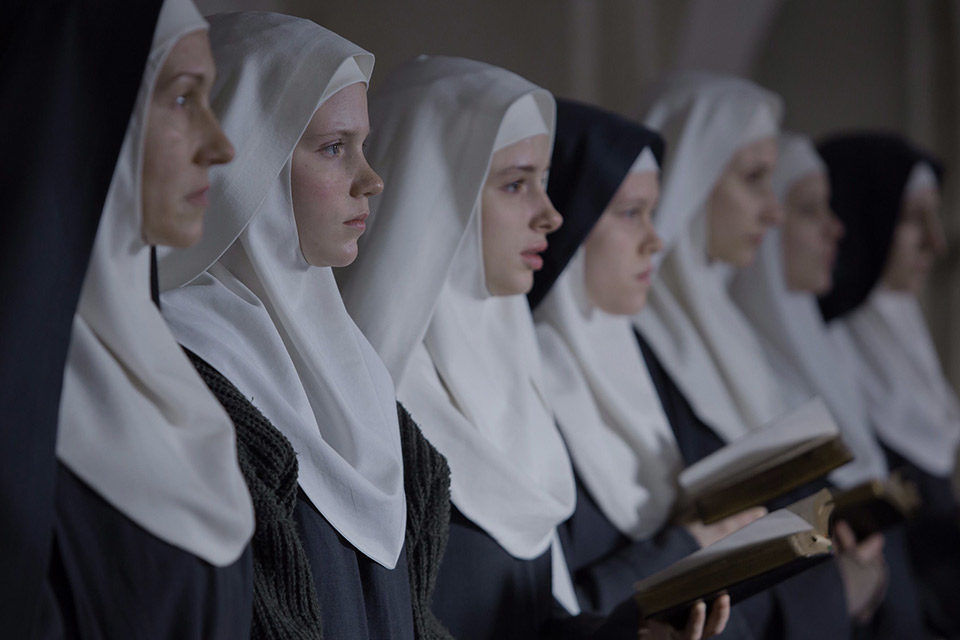
Review: The Innocents
The color blue ripples through Anne Fontaine’s The Innocents, in wintry shadows or clothing that suggests the celestial hue of a Madonna’s veil. The story begins in December 1945, as a group of Polish Benedictine nuns and novices gather in half-light for prayers and sing the serene medieval Advent chant “Conditor Alme Siderum,” a hymn to the “creator of the stars of night.” But in this season of waiting, the women aren’t anticipating only Christmas. They are also expecting other births, after a trauma that reverberates within the convent’s walls like a silent explosion.

The women were raped by Red Army soldiers following the Nazi occupation. Many are pregnant. Summoned by a frightened novice to help one who is in agonizing labor, a young doctor with the French Red Cross, Mathilde (Lou de Laâge), performs a cesarean by the light of a single glowing lamp, in the company of the formidable abbess (Agata Kulesza) and the kind younger nun Sister Maria (Agata Buzek). The chiaroscuro scene recalls a Georges de La Tour painting, but the surgery echoes the violence to which the women were subjected. Flesh and faith have both been violated.
Mathilde, an atheist who was raised in a communist family, is in Warsaw to treat French citizens, but she breaches protocol to help the sisters and keep their secret. The story is based on the experiences of the real-life résistante and doctor Madeleine Pauliac, who during the period treated French soldiers still in Poland, and also aided women who had been raped repeatedly, including nuns.

The Innocents
Sometimes wearing a blue scarf and sweater that link her character visually with the spiritual atmosphere of the convent, de Laâge plays Mathilde as a forthright nonbeliever who unhesitatingly accepts the women’s varying responses to their situation—one young woman in such denial that she unexpectedly gives birth on the floor of her cell—as well as the challenge to care for them in these extraordinary circumstances. Mathilde has a poignantly fleeting affair with Samuel (Vincent Macaigne, also in a fine performance), a sardonic but endearing fellow doctor who matter-of-factly tells her that his family was killed in Bergen-Belsen. “Yes, I’m Jewish. There are a few of us left,” he says impatiently to the abbess after Mathilde brings him to the convent when two members of the order are about to give birth at the same time.
Although Samuel is not a central figure in the story, the Holocaust casts a long shadow, and not only because Kulesza previously played the former state prosecutor whose Jewish family members were murdered in Pawel Pawlikowski’s Ida, a tormented and complex figure like the abbess. The Innocents also recalls Of Gods and Men, Xavier Beauvois’s chronicle of monks in Algeria who were killed by extremists after refusing to abandon the community to which they were dedicated. But the dilemma the monks face in Beauvois’s film contrasts with the trauma and shame women are left to grapple with in The Innocents. A measure of peace and joy is achieved at the end of Fontaine’s film, but one wonders what scars remain.
With an austere but painterly palette, DP Caroline Champetier subtly captures the frost-bound landscape and figures and faces of the nuns. The Innocents observes the women’s struggles with a somber reserve. Maria, who has a past and seems wise beyond her years, says: “However much I pray, I cannot find any consolation. Every day I relive what happened. Every day. I still smell the stench of them.” But in a less despairing moment she tells Mathilde: “Faith is 24 hours of doubt and one minute of hope.”
In addition to more widely known Latin chants, the spare soundtrack includes music by the 12th-century Benedictine abbess, scholar, mystic, and composer Hildegard von Bingen. The ethereal vocals evoke a longing for the eternal—which, in one character’s response to the trauma, is destructive rather than beautiful—but also recall the power of female community and solidarity in a fallen world.
Kristin M. Jones is a writer based in New York, covering art and film for publications including FILM COMMENT, Frieze, and the Wall Street Journal.







